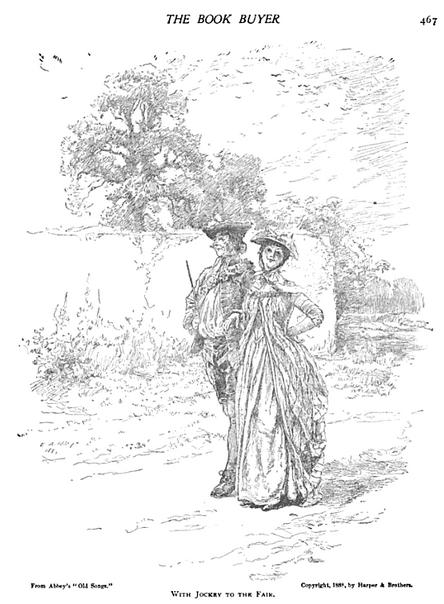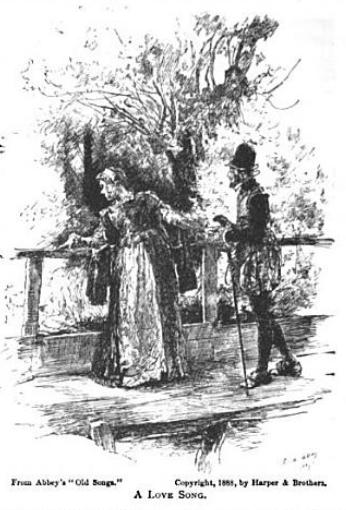Uncollected Essays
Old English Songs.
by Sarah Orne Jewett.
by Sarah Orne Jewett.
Review of Old Songs, compiled and
illustrated by Edwin A. Abbey and Alfred Parsons.
The Book Buyer 5.11 (Dec 1, 1888):
466-468.

They are beautifully printed and bound in this new edition. As for the pictures, it seems as if Mr. Abbey and Mr. Parsons must have lived once before, in that boisterous, gay, sentimental age when the old ballads were written. They had sketchbooks too, and have found them again in secret cupboards of the old London houses. Else how could they draw these maids and men to the life? It would be hard enough to find the rustic harvesters and the taverns, but when it comes to Sally in Our Alley and her young man, our Mr. Abbey saw them himself once, stepping bravely forth that Sunday morning, and could never forget, nor can we, the pleasing sight. Here are the maids and men whom the old songsters themselves saw, whom they courted and sang; here are the very flowers that bloomed for breast-knots, and Mr. Parsons has drawn them so that they will be fresh and alive for us the year round.

And since spring comes every year, and true lovers and heartless maidens and hay-making and late suppers and good company still exist, for the Old Songs' sakes and for their new pictures' sakes let everybody turn at least one page of such an enchanting book.
*Old Songs. Illustrated by Edwin A. Abbey and Alfred Parsons. 410 leather, $7.50. Harper & Brothers, New York.
Editor's Notes
Botargo: "a Mediterranean delicacy of salted, cured fish roe, typically from grey mullet, tuna, or swordfish." (Wikipedia)
Samuel Pepys: "(23 February 1633 – 26 May 1703) was an English naval administrator and Member of Parliament who is now most famous for the diary he kept for a decade while still a relatively young man." (Wikipedia)
Redfern & Sons: "(later Redfern Ltd), was a British couture house, (open c.1850 to 1932; 1936–40) founded in Cowes on the Isle of Wight. By the 1890s it had branches in London, Paris, Edinburgh, and New York." (Wikipedia)
George Wither: "(11 June 1588 O.S. – 2 May 1667 O.S.) was an English poet, pamphleteer, and satirist. He was a prolific writer who adopted a deliberate plainness of style." (Wikipedia)
Sir John Suckling: "(10 February 1609 – 1 June 1642) was an English poet and one prominent figure among those renowned for careless gaiety, wit, and all the accomplishments of a Cavalier poet; and also the inventor of the card game cribbage. He is best known for his poem 'Ballad Upon a Wedding.'" (Wikipedia)
Edited by Terry Heller, Coe College
Main Contents & Search
Uncollected Essays